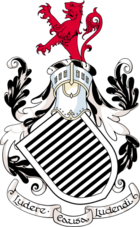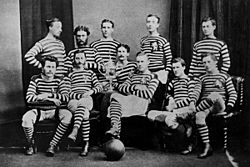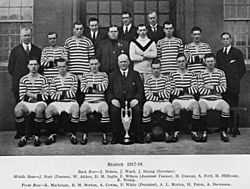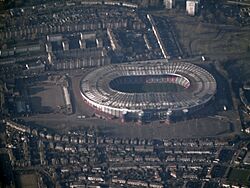Queen's Park F.C. facts for kids
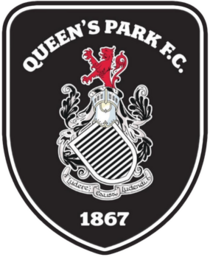 |
||||
| Full name | Queen's Park Football Club | |||
|---|---|---|---|---|
| Nickname(s) | The Spiders | |||
| Founded | 9 July 1867 | |||
| Ground | Lesser Hampden, Glasgow | |||
| Capacity | 990 | |||
| President | Graeme Shields | |||
| Head coach | Sean Crighton | |||
| League | Scottish League One | |||
| 2015–16 | Scottish League Two, 4th (promoted via play-offs) | |||
|
||||
Queen's Park Football Club is a Scottish professional football team from Glasgow. They play in the Scottish League One, which is the second highest league in Scotland. Queen's Park is the oldest football club in Scotland, started in 1867. It is also the 10th oldest in the world!
For 152 years, the club was made up of only amateur players. This means they played for the love of the game, not for money. Their motto was 'Ludere Causa Ludendi', which means 'To Play for the Sake of Playing'. In November 2019, the club decided to become professional. Their team colours have almost always been white and black hoops.
Queen's Park is the only Scottish club to have played in the English FA Cup Final. They reached the final twice, in 1884 and 1885. They have won the Scottish Cup 10 times, which is the third most of any club. Only Celtic and Rangers have won it more. Their last Scottish Cup win was in 1893.
For over 100 years, Queen's Park's home stadium has been Hampden Park in Glasgow. This stadium is also where the Scotland national team plays. The club has also used Lesser Hampden, a smaller ground next to the main stadium. They plan to make Lesser Hampden their main home stadium.
| Top - 0-9 A B C D E F G H I J K L M N O P Q R S T U V W X Y Z |
Club History
How Queen's Park Started (1867–1868)
Queen's Park Football Club began on July 9, 1867. A group of gentlemen met to create a football club. They were from the local YMCA and played football matches in Glasgow. They debated many names, but 'Queen's Park' won by just one vote.
While not the very first club in Britain, Queen's Park was the first Association football club in Scotland. Their first game was against a Glasgow team called Thistle F.C. on August 1, 1868, which Queen's Park won 2–0.
Early Success (1868–1900)
Queen's Park was very important in the early days of Scottish football. They helped create the rules and even managed the Scotland national team at first. They also helped start the Scottish Football Association and the Scottish Cup. This showed they were the top club in Scotland.
On November 30, 1872, all eleven players for Scotland in a match against England were from Queen's Park. They wore blue jerseys, which were Queen's Park's colours at the time.
Queen's Park helped form the Scottish Football Association on March 13, 1873, with seven other clubs. The first game at the first Hampden Park was on October 25 against Dumbreck. This was also the first time Queen's Park players wore their famous black and white hooped jerseys. This is how they got their nickname, 'The Spiders'. They won that game 7–0, which was their first Scottish Cup match. They went on to win the Scottish Cup final that year, beating Clydesdale 2–0.
They won the Scottish Cup again in the next two years. In 1876, they lost their first-ever game, 2–1 to Vale of Leven. Queen's Park won the cup again in 1880, and then twice more against Dumbarton. In 1884, they won the cup without even playing the final because Vale of Leven refused to play.
Scottish clubs were sometimes invited to play in England's FA Cup. Queen's Park reached the final twice, losing to Blackburn Rovers in 1884 and 1885. They stopped entering the FA Cup after 1887.
As other teams got stronger, Queen's Park's dominance in the Scottish Cup lessened. They won it again in 1890 and their 10th and final time in 1893, beating Celtic 2–1. In the same year, professional football was allowed in Scotland. Queen's Park refused to join the new Scottish Football League in 1890 because they wanted to stay amateur. However, they finally joined the Scottish League in 1900, going straight into the top division.
Some famous Queen's Park players from this time include Charles Campbell, who won eight Scottish Cups, and Andrew Watson, the first black football player in Britain.
How Queen's Park Changed Football
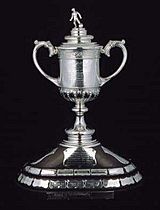
Queen's Park is known for creating a new way of playing football called 'combination' football. This involved players passing the ball to each other as a team, rather than just dribbling it individually. Before this, many teams, especially in England, focused mostly on dribbling.
The club practiced a lot and tried out new playing styles. They would divide into teams like "North vs. South" or "Reds vs. Blues" to develop their passing game. This new style of play, with lots of passing and teamwork, made Scottish football very skillful. It even led to many Scottish players moving to English clubs, which helped spread this new way of playing.
The first official international match between Scotland and England in 1872 showed this difference. England's players were good at dribbling, but Scotland's team, made up entirely of Queen's Park players, was praised for their "passing the ball." This new style of play helped change how football was played around the world.
Queen's Park and the English FA Cup
In 1870, Queen's Park joined The Football Association (FA) in London, which was the only football governing body then. They were interested in the new FA Cup. Queen's Park reached the semi-finals in 1872 but had to pull out due to money problems. They didn't play in the FA Cup much until 1884, when they reached the final but lost to Blackburn Rovers. They lost to Blackburn again in the 1885 final. In 1887, Scottish clubs were no longer allowed to enter the FA Cup.
Queen's Park also helped introduce the solid crossbar to football. They suggested it at an FA meeting in 1875, and it was accepted.
In 1899, Queen's Park was invited to play in the Sheriff of London Charity Shield. This match was between the best amateur and professional teams. Queen's Park, an amateur team, played against Football League First Division champions Aston Villa. The game ended in a draw, so both teams shared the trophy.
Queen's Park in the Scottish Top League (1900–1958)
Queen's Park finally joined the Scottish League's top division in 1900–01. They found it tough playing against professional teams. A highlight was a 1–0 win over Celtic when the new Hampden Park opened in 1903.
They were relegated in 1922 but quickly won Division Two the next season to get back to the top. In 1929, they had their best-ever finish in the Scottish League, coming in 5th place. Player James McAlpine was a key part of this success, scoring many goals.
World War II helped Queen's Park stay in the top league a bit longer. Many young players got a chance to play. After the war, they were relegated in 1948. However, they built a strong team and won Division Two again in 1955–56. They only stayed in the top division for two seasons before being relegated again in 1958.
League Changes (1958–1994)
In the mid-1960s, a new Queen's Park team showed promise, finishing fourth in the league in 1965 and 1968. However, they didn't win any trophies.
In 1975–76, the Scottish Leagues were reorganized. Queen's Park joined the Second Division (the third tier). They also hired their first head coach, Davie McParland.
Former player Eddie Hunter became manager in 1979. Within two seasons, Queen's Park won the Second Division championship in 1980–81. They had many talented young players. However, they were relegated again in 1983 after losing some of their best players to bigger clubs.
The team improved again in the mid-1980s, finishing 4th in 1985–86 and 3rd in 1987–88. They came close to promotion in 1990–91 but finished 5th.
Recent History (1994–2019)
Eddie Hunter left as manager in 1994. The club struggled for a few years. A fun memory from this time was a 5–1 win over Albion Rovers in 1997.
Becoming Professional
Before hiring a new manager, the club changed its rules. They could now sign former professional players, as long as the club didn't pay them. John McCormack became the new coach in 1998. He used the new rules well, bringing in experienced players. Queen's Park won the Third Division championship in 1999–2000.
Ups and Downs
After promotion, Queen's Park only stayed in the Second Division for one season. They were relegated again. The next season, they finished last in the Third Division for the first time ever.
Kenny Brannigan became manager in 2003 but had a short, unsuccessful time. Billy Stark took over in 2004. In 2006–07, Queen's Park won promotion through the play-offs. They beat SPL team Aberdeen in a League Cup penalty shootout, which was a big win. Their playing style was praised by other coaches.
Billy Stark left in 2008, and Gardner Speirs took over. Queen's Park was relegated to the Third Division in 2009. In 2012–13, they had their best season in years, finishing third. However, they lost in the play-offs and didn't get promoted. Many talented young players from that team, like Andrew Robertson, moved to other clubs.
In 2014–15, Queen's Park finished 2nd and reached the play-offs again but lost to Stenhousemuir. However, they were promoted in 2015–16 after beating Clyde in the play-off final.
150th Anniversary
Queen's Park celebrated its 150th birthday on July 9, 2017. After finishing ninth in 2017–18, they were relegated to Scottish League Two. In the 2018–19 Scottish Challenge Cup, they had a good win against The New Saints from Wales.
Queen's Park Becomes Professional (2019–Present)
A big change happened in 2019. Club members voted to end their amateur status and allow the club to hire professional players. This meant the club could sign players to longer contracts and get money if players moved to other teams.
Ray McKinnon became the new head coach in January 2020. Queen's Park signed many professional players. They went on to win the 2020–21 Scottish League Two title and were promoted to League One.
In January 2021, Leeann Dempster became the club's new chief executive. Ray McKinnon left at the end of the 2020–21 season. Laurie Ellis took over but left in December 2021.
Owen Coyle became manager in March 2022. Queen's Park achieved back-to-back promotions, moving from the fourth tier to the second tier of Scottish football. They beat Dunfermline Athletic and Airdrieonians in the play-offs.
In their first season back in the second tier, Queen's Park almost got promoted to the Scottish Premiership but lost in the play-offs. Owen Coyle then left.
In June 2023, Robin Veldman from Ajax and Anderlecht became the new head coach. He left in December 2023 after a difficult period.
Callum Davidson became the new head coach in January 2024. He brought in new players like Danny Wilson and Cammy Kerr. On May 3, 2024, Queen's Park finished 8th in the 2023–24 Scottish Championship, avoiding relegation.
On July 27, 2024, Queen's Park made it out of the Scottish League Cup group stage for the first time. On February 9, 2025, Queen's Park beat Rangers 1–0 in the Scottish Cup, which was a huge surprise!
Rivals and Friends
Queen's Park is located between the big Glasgow clubs, Celtic and Rangers. Because Queen's Park was amateur for so long, they didn't play in the same league as Celtic and Rangers very often. Instead, they had rivalries with teams in lower divisions like Partick Thistle, Clyde, and Albion Rovers.
Since the 2000s, Queen's Park fans have become good friends with supporters of the German club SG Wattenscheid 09. This is because both clubs have similar black and white home colours.
Supporters
Queen's Park has a supporters' association that started in 1947. They have members all over the world. The Queen's Park Supporters' Association (QPSA) helps organize bus trips to away games, raises money, and publishes newsletters.
Some of Queen's Park's most vocal fans are known as the 'Irn Bru Firm'. This nickname comes from the club's past connection to the soft drink. They stand and sing traditional chants at games.
Recently, some Queen's Park supporters have formed 'ultras' groups called the 'SouthSide Ultras' and 'Section 67'. Both groups bring drums and flags to matches, helping to create a lively atmosphere.
Team Kit History
| Year | Manufacturer | Sponsor |
|---|---|---|
| 1867–1977 | Own Brand | N/A |
| 1977–1989 | Bukta | Granyte Paints (1988–89) |
| 1989–1994 | Umbro | N/A |
| 1994–2001 | Le Coq Sportif | Irn-Bru (1996–2022) |
| 2001–2003 | Fila | |
| 2003–2006 | Diadora | |
| 2006–2013 | Joma | |
| 2013–2020 | Under Armour | |
| 2020–2022 | Admiral | |
| 2022–2023 | Macron | Scotts |
| 2023– | Adidas | City Facilities Management |
Stadium Information
When Queen's Park started in 1867, they played at the Queen's Park Recreation Ground. In 1873, they moved to their first enclosed ground, which they called Hampden Park. This ground became popular for international matches and cup finals. However, in 1883, they had to leave to make way for a railway.
After playing at another ground for a year, a second Hampden opened in 1884. To keep their important place in Scottish football, Queen's Park bought land and opened the third Hampden in 1903. This is the Hampden Park we know today.
Hampden Park is the national football stadium of Scotland. It hosts major cup finals and most Scotland international games. It was the largest stadium in the world until 1950. After safety changes, its capacity is now 51,866. Even though it's a huge stadium, Queen's Park's average attendance is around 1,800.
Hampden Park was used for the 2012 Olympic Games and was changed into an athletics venue for the 2014 Commonwealth Games. This meant Queen's Park had to play their home games elsewhere for a year. The stadium has also hosted other sports and many music concerts.
Lesser Hampden is a smaller ground next to the main stadium. Queen's Park traditionally used it for training and youth matches. In 2018, a deal was made for the Scottish Football Association (SFA) to buy Hampden from Queen's Park. Queen's Park planned to improve Lesser Hampden and play their matches there.
By August 2020, the SFA owned the main stadium, and a new facility was being built at Lesser Hampden. Queen's Park played their last match at Hampden on March 20, 2021. They then shared stadiums like Falkirk Stadium, Firhill, and Ochilview for a few seasons.
On June 8, 2023, Queen's Park announced they would use Hampden Park for their home matches again for the upcoming season. This agreement was extended for the 2024–25 season.
From the 2025–26 season, Queen's Park will return to Lesser Hampden, now called the City Stadium for sponsorship reasons. It will have a capacity of 990.
Average Home Game Attendance
| Year | Average attendance |
Stadium |
|---|---|---|
| 2010/11 | 566 | Hampden Park |
| 2011/12 | 519 | |
| 2012/13 | 2,803 | |
| 2013/14 | 402 | Excelsior Stadium |
| 2014/15 | 509 | Hampden Park |
| 2015/16 | 518 | |
| 2016/17 | 566 | |
| 2017/18 | 688 | |
| 2018/19 | 573 | |
| 2019/20 | 583 | |
| 2020/21 | 0 | Falkirk Stadium |
| 2021/22 | 593 | Firhill Stadium |
| 2022/23 | 911 | Ochilview Park |
| 2023/24 | 1,798 | Hampden Park |
| 2024/25 | 1,608 | Hampden Park |
Current Team Squad
First Team Players
|
|
Players on Loan
|
Coaching Staff
| Position | Name |
|---|---|
| Head coach | Sean Crighton |
| Assistant head coach | Jim Duffy |
| Goalkeeping coach | David Scott |
| Head of recruitment | David Stevenson |
| Performance analyst | Conor Flanagan |
| Head physiotherapist | Jorge Pismante |
| Head of sport science | Ross Banks |
| Club doctors | Simon Gibson Kevin Thomson |
| Academy director | Tommy McIntyre |
| U19s head coach | Charley King |
| U17s head coach | Lee Mitchell |
Manager History
| Year | Name |
|---|---|
| 1908–1928 | John Nutt |
| 1928–1946 | Bert Manderson |
| 1946–1963 | Willie Gibson |
| 1963–1965 | Eddie Turnbull |
| 1965–1969 | Harold Davis |
| 1969–1974 | Tommy Duncan |
| 1974–1976 | Davie McParland |
| 1976–1979 | Joe Gilroy |
| 1979–1994 | Eddie Hunter |
| 1994–1997 | Hugh McCann |
| 1997–1998 | Graeme Elder |
| 1998–2002 | John McCormack |
| 2002–2004 | Kenny Brannigan |
| 2004–2008 | Billy Stark |
| 2008–2013 | Gardner Speirs |
| 2014–2018 | Gus MacPherson |
| 2018–2019 | Mark Roberts |
| 2019–2021 | Ray McKinnon |
| 2021–2022 | Laurie Ellis |
| 2022 | Gardner Speirs |
| 2022–2023 | Owen Coyle |
| 2023 | Robin Veldman |
| 2024–2025 | Callum Davidson |
Club Records
- Most capped player: Walter Arnott (14 caps while at the club)
- Most league points in a season (3 points for a win): 69 points (Third Division – 1999–2000 season)
- Most league points per game in a season (3 points for a win): 2.45 points (League Two – 2020–21 season)
- Record appearances: Ross Caven (594 games)
- Record goal scorer: James McAlpine (163 goals)
- Most league goals in a season: Willie Martin (30 goals – 1937–38 season)
- Biggest win: 16–0 vs St Peters (Scottish Cup, August 26, 1885)
- Biggest defeat: 0–9 vs Motherwell (Division One, April 29, 1930)
- Record attendance: 95,722 vs Rangers (Scottish Cup, January 18, 1930)
- Longest time as club manager: Eddie Hunter (15 years)
- Fastest hat-trick: David Galt (5 minutes vs Elgin City, March 16, 2019)
- Highest transfer fee received: £350,000 (Callan McKenna to AFC Bournemouth, January 30, 2024)
- Highest transfer fee paid: £50,000 (estimated) (Nikola Ujdur from Inverness CT, July 26, 2024)
Club Honours (Trophies)
Major Trophies
League Titles
- Scottish second tier
- Winners (2): 1922–23, 1955–56
- Scottish third tier
- Winners: 1980–81
- Play-off winners: 2021–22
- Winners: 1980–81
- Scottish fourth tier
- Winners (2): 1999–00, 2020–21
- Play-off winners: 2006–07, 2015–16
- Winners (2): 1999–00, 2020–21
Cup Wins
- Scottish Cup
- Winners (10): 1874, 1875, 1876, 1880, 1881, 1882, 1884, 1886, 1890, 1893
- Runners-up (finalists): 1892, 1900
- Winners (10): 1874, 1875, 1876, 1880, 1881, 1882, 1884, 1886, 1890, 1893
- Sheriff of London Charity Shield
- Winners: 1899 (shared)
- FA Cup
- Runners-up (finalists): 1884, 1885
Other Trophies
- Football World Championship:
- Winners (4): 1876, 1881, 1882, 1893
- Glasgow Cup
- Winners (4): 1889, 1890, 1899, 1946
- Glasgow League
- Winners (1): 1896–97
- Glasgow Merchants Charity Cup
- Winners (8): 1877, 1878, 1880, 1881, 1883, 1884, 1885, 1891
- Ayr Charity Cup
- Winners (5): 1918, 1920, 1922, 1923, 1925
- Scottish Amateur Cup
- Winners (12): 1912, 1920, 1928, 1933, 1934, 1936, 1947, 1950, 1951, 1963, 1964, 2009
- SPFL Reserve League
- Winners (3): 2013–14, 2023–24, 2024–25
- SPFL Reserve League Cup
- Winners (1): 2013–14
See also
 In Spanish: Queen's Park Football Club para niños
In Spanish: Queen's Park Football Club para niños
- Club of Pioneers
- List of Queen's Park F.C. players (100+ appearances)
- List of Queen's Park F.C. international players


